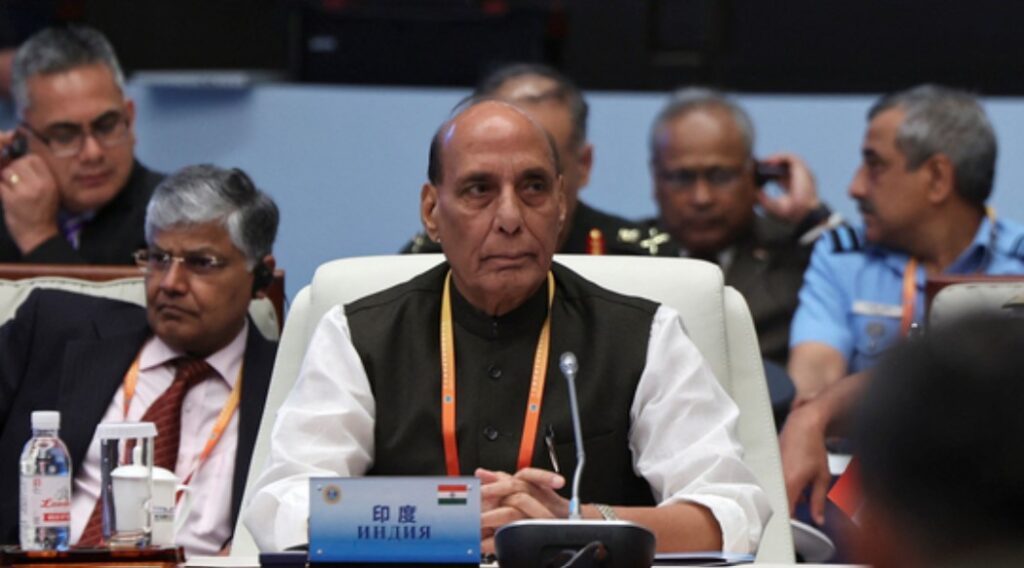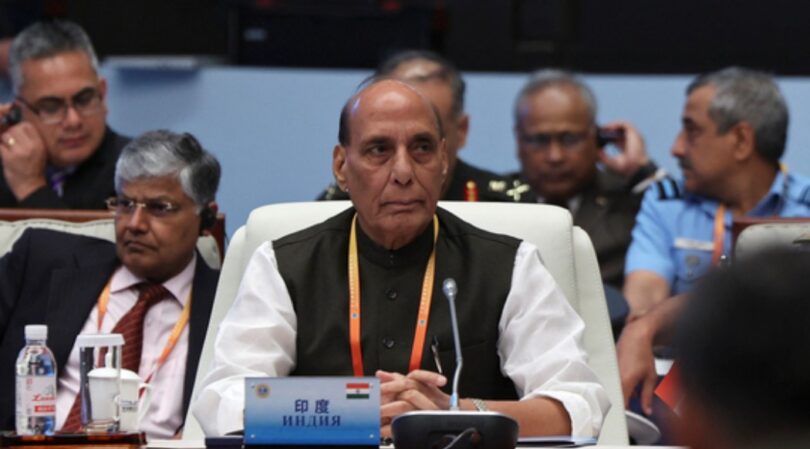On 26 June 2025, India’s Ministry of External affairs stated India’s decision to decline from signing the joint statement at the Shanghai Cooperation Organisation (SCO) Defence Ministers’ meeting in Qingdao, China. It clearly stated that the joint statement at the SCO failed to encompass India’s concerns on terrorism. The SCO defence ministers’ meeting is being held from 25 June to 26 June in Qingdao, aiming at defence leaders from member states including India, China, Russia, and several Central Asian nations to discuss vital issues related to regional and international peace and security.
SCO is an intergovernmental organisation which functions to promote regional security and stability through cooperation and dialogue. India became a full member in 2017 and held the rotating chairmanship in 2023. China has assumed the chair for 2025 under the theme “Upholding the Shanghai Spirit: SCO on the Move”. Given China’s close ties with Pakistan, India’s arch-rival, and its ambitious Belt and Road Initiative (BRI), it can be anticipated how the dragon may utilize the SCO chair to its benefit. Hence the blatant disregard for India’s concern may be overruled over Pakistan’s seethingly exaggerated narratives. Thus the biased document in favour of Pakistan at the SCO.
Upon viewing the draft statement presented at the SCO, the Indian Defence Minister Rajnath Singh rejected the draft statement as the document evidently exempted the Pahalgam terror attack on 22 April 2025, which killed 26 people. Contradictorily, the document, mentioned the Jaffar Express hijacking in Pakistan by the Balochistan Liberation Army on 11 March 2025.
Due to the duplicitous nature of the document to discount the heinous Pahalgam attack reflected in India’s stance.
“India wanted concerns on terrorism reflected in the document, which was not acceptable to one particular country, and therefore the statement could not be adopted,” Jaiswal said.
While it is ascertained that the two-day defence ministers’ meeting in China concluded as scheduled, the final joint statement failed as a result of lack of consensus among member states. The Indian Defence Minister Rajnath Singh emphasised on India’s zero-tolerance policy towards terrorism, urging all 11 participating countries to take a united stand. “The perpetrators, organisers, financers, and sponsors of reprehensible acts of terrorism—including cross-border terrorism—must be held accountable and brought to justice,” he stated.

Rajnath Singh highlighted the biased application of counter-terrorism standards and made an indirect reference to Islamabad’s track record, stating that “There should be no double standards on terrorism. Peace and prosperity cannot co-exist with terrorism”. From such a document formulated by the SCO, it may be assumed that the exclusion of the Pahalgam attack may have occurred to benefit Pakistan’s rhetoric by big brother China.
Pakistan’s former minister Bhilawal Bhutto and its defence minister Khwaja Asif had candidly affirmed Pakistan’s involvement in home-grown terrorism, while providing the necessary logistics and funds to aid proxy wars across its borders. Pervez Musharraf, in an interview, had also mentioned Pakistan’s recruitment of mujahedeen to create outfits like Taliban, hailing them as Pakistan’s “heroes”. Regardless of the open confessions, Pakistan maintains its stance of countering terrorism in the region, while designating its enemies, rebelling insurgents and neighbouring nations as terrorists or terror sponsors. In order to receive support on its narratives, it has followed a quid pro quo approach with nations like Azerbaijan, Turkey and China. Hence the exclusion of Pahalgam attack seemed not entirely surprising. In turn, Pakistan has blamed India for the Jaffar Express attack.
India has rejected Pakistan's allegations about its involvement in Balochistan while demanding that Islamabad self reflect instead of making fake accusations.
Asserting the necessity to hold perpetrators, organizers, financiers and sponsors of reprehensible acts of terrorism, including cross border terrorism accountable, Rajnath Singh stressed that “Any acts of terrorism are criminal and unjustifiable regardless of their motivation, whenever, wherever and by whomever committed. SCO members must condemn this evil unequivocally”.
He also addressed the need for proactive steps to prevent the spread of radicalisation among youth while highlighting the role played by the Regional Anti-Terrorist Structure (RATS) mechanism of the SCO.
“We should also take proactive steps to prevent the spread of radicalization among our youth. The RATS mechanism of SCO has played a significant role in this regard. The joint statement of the Council of SCO Heads of State on ‘Countering Radicalisation leading to Terrorism, Separatism and Extremism’ issued during India’s Chairmanship symbolises our shared commitment,” added Singh.
India’s refusal to sign the joint communique at the SCO meeting was consistent with its previous stances in multilateral forums, where it has consistently evaded any attempts to align fully with China’s plans.it is imperative to mention that India has prior declined to endorse paragraphs supporting China’s Belt and Road Initiative at the 2023 SCO summit and opposed China’s proposed Brics currency basket plan.
Defence Minister Rajnath Singh’s visit to China was regarded as the first high-level Indian ministerial visit since the 2020 border standoff in Eastern Ladakh. Initially, the visit was viewed as a “renewed momentum in India-China engagement”.
Singh had previously travelled to China as home minister. He had also met his Chinese counterpart Admiral Dong Jun in Vientiane, Lao PDR, on 20 November 2024 at the ASEAN Defence Ministers’ meet.
While Singh’s visit reflects the intent of both nations to build and improve ties, the debacle from excluding Pahalgam may bear some friction between the two states.










